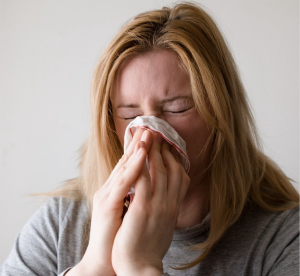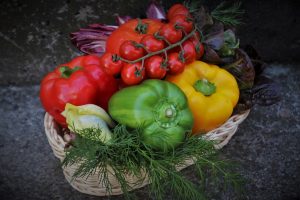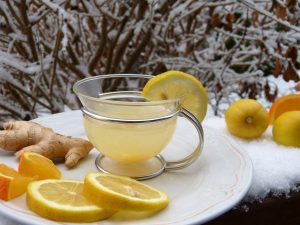Winter is coming: brace yourselves the natural way, boost your winter health
Summer is over and winter has begun casting its icy shadows over our immune systems. Charlotte Willis guides you through the best natural methods to boost your winter health over the cooler days…
There’s something quite romantic about winter days. The chilling air blowing gusty, ice-laden winds upon your skin. Wrapping up in scarves, jumpers and hoodies as we dash from heater to heater and from home to car. At night, we comfort ourselves with stews, soups and roast dinners, warming our hands with hot coffee cups and warm pastries. A British winter is both picturesque and testing at the same time. While the lack of light tries our willpower to make it out of bed in time for our 7 am spin class, winter brings with it a whole host of tribulations for our immune system to cope with.

Bleak winter
Colds, flu and sickness bugs begin to rear their ugly viral bodies as soon as October hits. It’s almost as if the cooler temperatures signal an influx of pathogens to become active, spreading into the air, transporting themselves via the blustery winds directly into our bodies with the full-force of the changing weather patterns. The bleakness of winter can catch us all off-guard, with many of us falling prey to the harsh trappings of cooler, darker days.
Our bodies are fighting for us, defending us and supporting us constantly. Just to give you an idea of the scale to which our cells miraculously protect us, it is estimated that we battle over one thousand harmful bacteria and viruses each day. This constant war waging between our environment and our body requires a large quantity of energy and resources to fuel it. It comes as no surprise that as winter begins to draw in, the darker days start to deplete our energy reserves and we begin to eat slightly differently, with less of an emphasis on fresh fruits and vegetables.

Cold air
Although being cold does not equate to you catching a cold (hello, old myths of the past), we do reach for the thermostat to produce hot, dry air within our homes and offices. This dry air can make it easier for viruses and pathogens to enter your respiratory system, leaving you susceptible to infection. Certain studies have also suggested that Rhinovirus (the most common virus causing the common cold) replicated more efficiently in a cooler, wintery nose than the warmer nasal environments you’ll have in the summertime, making your winter nose a perfect viral incubator!*
With this in mind, it makes sense that we prepare our bodies for the onslaught of pathogens about to come our way. Here are my go-to methods to help prevent damage and distress while you navigate your way through the wonderland that is the British winter.

Eat for winter
As the temperature drops, our bodies have to work that much harder to maintain body heat and sustain our defences. It’s time to eat your way to better immune health. First of all, ensure you are consuming enough carbohydrates and wholegrains, including brown rice, quinoa and rye. Think of these wholegrain carbohydrates as the logs that you place onto a flickering winter fireplace. Eating about three portions of these wholegrains per day will ensure that you are getting enough glucose-rich energy sources to power your internal fire, maintaining your body’s optimum functioning and cellular growth. Wholegrains will also provide essential fibre for your gut bacteria to feed upon. These bacteria maintain your immune health by providing a source of metabolites, which in turn, stimulate immune cell production.
You’ll also want to make sure your fridge is akin to a garden!
Fill your shopping baskets with seasonal fruit and vegetables. Green cabbages, purple berries, bright red beetroots, orange carrots, white cauliflower; the more colourful the better. A range of fresh fruit and vegetables will help support your immune system by providing a variety of antioxidants, vitamins and minerals.
As well as your veg intake, you should choose to drink antioxidant- rich teas such as matcha, green teas, hibiscus tea, and consider reducing the volume of caffeine you drink, as this often triggers a stress response in your cells, blunting the action of the immune response. The popular cold remedy of antiseptic lemon and honey, stirred lovingly in some cool water, is another fantastic drink to regularly sip on. Contrary to popular practice, using hot water with your lemon and honey will actually destroy the healthful properties present in the honey. Lastly, try as best you can to lay off the alcoholic beverages during winter months. The alcohol will impede your ability to cleanse your blood of pathogens and harmful toxins by occupying your liver. You’ll soon discover that the secret to great immune health lies at the end of your fork and the bottom of your cup.

Winter blues
The lack of light in the winter months can lead to a condition called Seasonal Affective Disorder (SAD). This mental health condition is more common than you may think and, despite its reputation as a faux condition, it is recognised as a formal disorder by the NHS. Symptoms of SAD include: a persistent low mood, a loss of desire to perform everyday activities, feelings of despair, lacking energy during the day, sleeping for longer than normal and craving carbohydrates.
To battle SAD, it is important that we take measures to protect our mental health during the winter. We should ensure we all get as much natural light exposure as possible, meaning it may be beneficial to schedule a mid-lunch stroll, working in a light and airy environment, and going for a Sunday afternoon run or exercising in daylight. You can also experiment with light therapy, using stimulating light boxes and lamps which are specifically designed to replicate the sunlight that we lack during the winter months. Taking Vitamin D and melatonin supplements can also help with SAD, but you should consult your doctor if you feel you are experiencing any of these key symptoms.
Nutritional aids
If you’re looking for natural supplements to help bolster your immune system in preparation for fighting off the great office cold of 2019, you may want to consider supplementing with one or more of the following natural solutions:
Tumeric
This anti-inflammatory spice is a natural immune booster. The curcumin present in the turmeric acts to help moderate the action of immune cells, particularly T-Cells and B-Cells. In fact, curcumin has been tipped by scientific research to provide protection for those with immune disorders, as well as cancer and heart disease. A wonder-spice if ever there was one.**
Garlic
Garlic contains allicin, which converts to sulphur containing compounds when chewed or exposed to the air. These compounds are thought to give garlic its medicinal properties. Garlic has been shown to help reduce the severity of cold and flu symptoms upon infection. A published study has also suggested that the regular supplementation of garlic will help prevent the chance of infection quite significantly, compared to taking a placebo supplement. *** If you don’t want to supplement, you can always choose to cook with garlic on a more regular basis during the winter months.
Echinacea
Part of the daisy family, Echinacea is a pink-flowered plant which can help you combat the common cold and flu this winter. Echinacea contains a complex combination of compounds (that’s a tongue-twister for sure!) which act in synergy to help support the immune system. The best way to take Echinacea is to use the pure tincture extract upon the appearance of the very first cold symptoms. Dilute approximately 10-15 drops of the tincture in a small glass of cool water and take with a meal.
Ginger
Ginger is well-known for being an anti-inflammatory spice. It can help reduce nasal inflammation and works to help aid the enzymatic processes associated with pathogen disposal. Freshly juiced ginger is a fantastic addition to a smoothie or morning juice, and its health benefits can also be reaped by use in your regular cooking too.
Vitamin D
(Not from nature!) While natural sources of Vitamin D, primarily sunlight, are scarce in the winter months here in the UK. I strongly recommend that everyone takes a supplement containing this essential health- affirming vitamin. Vitamin D is not only vital for bone health, but will also help maintain the innate immune response, reducing your susceptibility to infection. A dose of 25 micrograms (μg) per day is recommended.
* Source: https://www.healthline.com/health/does-cold-weather-make-you-sick#more-reasons
** Source: https://www.ncbi.nlm.nih.gov/pubmed/17211725
***Source: https://www.ncbi.nlm.nih.gov/pubmed/11697022
More from our health archives.

